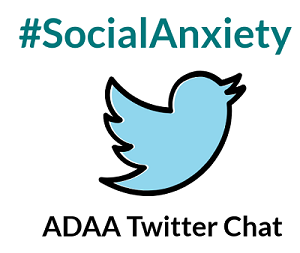ADAA Members Share Their Knowledge on Social Anxiety
ADAA Members Share Their Knowledge on Social Anxiety

On October 11, 2018, ADAA held a Twitter chat under the title #SocialAnxietyADAA. ADAA members Debra Kissen and Holly Scott answered questions on the signs and symptoms of social anxiety as well as coping tips and strategies.
1: What are the signs and symptoms of social anxiety?
Debra: The top sign of social anxiety is fear of criticism or negative evaluation. No one likes being criticized or viewed negatively but when this fear begins to impact functioning and avoidance takes over life, it may be time to consider #CBT for social anxiety disorder.
Holly: Symptoms of social anxiety can be:
- Physical: trembling, blushing, sweating, nausea
- Emotional: fear, dread of social events, irritability
- Behavioral: avoiding social situations
For more details, Here is an 8-minute recording of Dr. Larry Cohen describing Social Anxiety on the podcast NOT BROKEN.
2: What is the difference between social anxiety and just being shy?
Holly: Shyness is a personality trait that affects temperament. Examples: reluctance to enter some social situations or taking longer to warm up to new friends. Most people feel shy occasionally, but shy people can eventually adjust and enjoy social activities. Social anxiety disorder occurs when the person’s ability to live a normal life is affected negatively.
Debra: One can live a perfectly happy engaged life while feeling shy. To meet the definition of social anxiety disorder, one must be avoiding and not participating in key aspects of their life.
3: How common is social anxiety?
Debra: It is quite common to experience sub clinical levels of social anxiety. Even if one does not meet full criteria for social anxiety disorder many people struggle with fearing being judged negatively. The human experience can be rough and our brains are hardwired to fear being booted from the tribe for engaging in unacceptable or offensive behaviors. We can’t control hearing negative evaluation but we can control proceeding forward nonetheless.
Holly: About 7% of U.S. adults had social anxiety disorder in the past year.
An estimated 12.1% of U.S. adults experience social anxiety disorder at some time in their lives.
4: I really struggle with public speaking. Is this social anxiety?
Holly: The fear of public speaking is a form of social snxiety and is the most common phobia ahead of death, spiders, or heights. The National Institute of Mental Health reports that public speaking anxiety affects about 73% of the population. The underlying fear in public speaking is FEAR of judgment or negative evaluation by others. A common fear in public speaking is the brain freeze. The prospect of having an audience’s attention while standing in silence feels like judgment and rejection. Silence is OK. Get comfortable with silence by practicing it in conversations. What feels like an eternity to us may not feel that way to the audience. Practice tolerating the discomfort that comes with elongated pauses.
Debra: Public speaking anxiety is a sub type within social anxiety disorder. Public speaking anxiety may not be problem if one does not have the need to engage in public speaking throughout their life. Public speaking anxiety becomes a clinical problem when one avoids professional and personal opportunities that could be meaningful and important and ones world gets smaller to avoid experiencing anxiety.
5: How can social anxiety be treated?
Debra: The good news is that #CBTworks. By gradually and systematically approaching your social anxiety fears, you can rewire your brain to react less to criticism and judgment.
Holly: To read or listen to some personal stories and to see the quite varied ways that doing CBT for social anxiety has helped many people turn their lives around, go to this page.
6: My 13-year old child refuses to go to any social gatherings. Should I force her to go? Does she have social anxiety?
Holly: A shy teen often uses avoidance to alleviate their fears of being judged or criticized. This avoidance strategy can create a lost opportunity to establish healthy social skills that typically develop during the transition from adolescence to adulthood. Help your teen find ways to face fears, rather than avoid them. Encourage them to brainstorm ideas that may make it easier the next time. Help them work through their fears in advance and create a new plan for future anxiety-provoking situations.
Debra: The overall treatment approach for social anxiety is to compassionately and consistently encouraging oneself (or child) to push forward and face fears. A thorough evaluation is always helpful to assess for social anxiety disorder and rule out other causes of the avoidance behavior.
7: What are some quick tips and tools to move past social anxiety disorder?
Holly: Don’t dwell on the negative aspects of past social interactions. Focus on what went well. What can you learn from it? Don’t avoid opportunities to create a more positive memory. TRY AGAIN.
Debra: 1. You don’t have to face all of your fears at one time. Break down your fears to small manageable components. 2. You can handle being uncomfortable. 3. You are stronger than you know.
Note – information provided is intended for informational purposes only.












